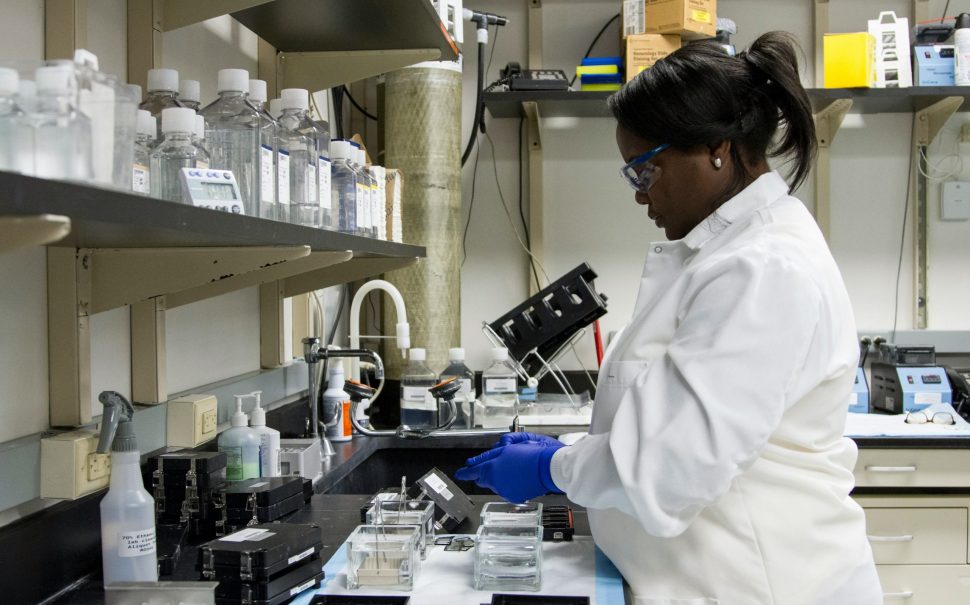London has screened fewer women for cervical cancer than any other region in England for three years in a row, according to NHS data.
The figures show the average coverage for cervical screenings, also known as smear tests, among women aged 25-49 from 31 March 2021 to 31 March 2024.
London screened 58% of eligible women in this age group in 2023-24, almost eight percentage points below the national average and 13 below the North East, which had the highest coverage in each of the last three years.
Bromley screened the most women out of all London local authorities last year with an average coverage of just over 71%, while Kensington & Chelsea screened the fewest at 42.5%.
The figures also show London is not progressing towards the NHS’s target of screening 80% of all eligible women: coverage has fallen by 1.6% across the period, though this is in line with a national trend of decline.
Karen Hobbs, from Southwark, was diagnosed with cervical cancer at the age of 24 and said she finds the figures “surprising”.

cervical cancer in her twenties.
Image credit: Karen Hobbs.
She added: “There are a million reasons why women don’t get screened, and campaigns can’t always go deep enough to tackle the more complex ones.”
The now 34-year-old was too young for a cervical screening at the time, but was tested after experiencing brown discharge while on the contraceptive pill and bleeding during sex.
After it was confirmed she had cervical cancer, Hobbs underwent a radical trachelectomy to remove her cervix and some surrounding tissue, and the cancer has not returned since.
Hobbs is now advocacy and media consultant for the national gynaecological cancer charity The Eve Appeal, based in south-east London, and encourages other women to go for screenings.
She said of her diagnosis: “It was the most out-of-body experience I’ve ever had.
“It was like what you see in films when the character’s hearing and vision go and there’s a weird beeping sound.
“It was the definition of shock.”
Societal barriers in London
Cervical cancer is the 14th most common cancer among women in the UK and is almost always caused by human papillomavirus (HPV), which is spread through sexual or skin-to-skin contact.
A smear test is a preventative procedure whereby a speculum is used to gather cells from the cervix, which are then examined for changes that could lead to cervical cancer.
Women are eligible for screening every three years from the age of 25.
According to a recent survey commissioned by consumer champion HealthWatch, women would be more likely to take up cervical screenings if they had access to a same-gender member of staff, a wider choice of appointment times and greater sensitivity about their worries.
But Helen Hyndman MBE, the nurse in charge of The Eve Appeal’s ‘Ask Eve’ information service, agrees with Hobbs that broader societal barriers also contribute to London’s low screening coverage.
Hyndman explained language barriers, religious beliefs, past sexual trauma and wheelchair inaccessible GP surgeries may prevent some women from going to screenings.
She added: “All sorts of things impact on why screening levels are as they are in London.
“Most people we talk to are afraid and embarrassed.
“I used to be one of the worst for not going when I was invited, because even as a nurse I didn’t understand the importance of regular smear tests and I was scared it would hurt.
“It literally takes two minutes, and it can save your life.
“But I think there’s more we can do in the NHS to make screenings more comfortable, accessible and inclusive so that everyone feels safe to access them.”
Ciara Lawrence, an ambassador for The Eve Appeal’s ‘Get Lippy’ awareness campaign, says the inaccessibility of smear tests is a major barrier for women with learning disabilities.
Lawrence, who has a learning disability herself, attended her first cervical screening in 2019 after her cousin died from cancer, and now encourages others to take up their invitations.
The 45-year-old from Surrey said a lack of easy-read material on cervical screenings, as well as the ableist attitudes of some healthcare professionals, may contribute to low screening levels.
Lawrence said: “Some people believe we don’t need smear tests because [people with learning disabilities] don’t have sex and that’s completely wrong.
“We have a right to have relationships, we have a right to have sex and date like anybody else.”
Lawrence, who works for the learning disability charity Mencap, brought a friend with her to the screening and said the nurse made her feel “empowered” by talking her through the procedure and not patronising her.
'You are in control'
The HealthWatch survey also found almost three-quarters (73%) of respondents would use a home HPV testing kit if they were available on the NHS.
These kits are available in pharmacies but reportedly cost from £29 to £129.
Over half of respondents cited greater privacy and comfort as a benefit of self-testing, and 47% said the kits would make it easier to find time for screenings.
Lawrence believes this may be one way of making cervical screening more accessible, though she emphasises the need for flexibility and adapting to individuals’ needs.
Sophia Lowes, senior health information manager at Cancer Research UK, said home HPV testing is a positive development but more research is needed to determine their accuracy.
She added women can request adjustments to in-person screenings, including asking for a different sized speculum or asking the examiner to slow down or stop.
She said: “Throughout the entire process, you are in control of that.
“It’s difficult to pinpoint any specific reason why one area might have higher or lower coverage.
“The trend of falling cervical screening coverage is something we’ve seen in England for a long time, and we want to see health systems remove barriers so that everyone who wants to take up screening can.”
NHS England London said said it is working to improve screening coverage by training staff to recognise the impact of language barriers, disability and physical and psychological access issues including female genital mutilation.
The organisation cited its My Body Back service, which provides a counselling appointment before a smear test is undertaken, as well as continued provision of the HPV vaccination which has cut cervical cancer cases in the UK by 90%.
North West London Integrated Care System, which covers Kensington and Chelsea, said in a statement it is working with NHS England to make self-sampling accessible to women who do not participate in traditional screening, following a trial in 2021.
The ICS added: “We continue to work with our health equity and public health teams to gain local knowledge of these groups and how best to engage with them, as well as primary care to increase screening uptake.”
Featured image credit: National Cancer Institute





